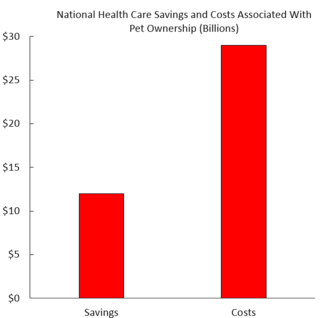Health
Three Reasons Why Pets Don't Lower Health Care Costs
It's nice to think that pets reduce our nation's medical bills...but is it true?
Posted January 4, 2016

“Want To Save On Health Care Costs? Get A Pet!” announced a recent headline in the Sacramento Bee. The idea that dogs and cats can help solve America’s spiraling health care bill is certainly appealing. After all, the United States spends vastly more money per capita on health care than any other developed country yet we come in dead last on measures of medical and psychological well-being. But is this claim justified?
The newspaper article was based on a report by the Human Animal Bond Research Initiative (HABRI). The report (here) concluded that pet ownership reduces health care costs in the United States by at least $11.8 billion dollars a years. HABRI is a pet products industry trade group which encourages pet ownership by promoting the health benefits of companion animals. (Their website states “When people become more aware of these benefits, they are more likely to acquire pets and recommend them to others.”) HABRI funds research on the human-animal bond and maintains an important clearing house for information based on scientific studies of the human animal bond. (This excellent review of research on the use of animal assisted therapy for the treatment of post traumatic stress disorder by Marguerite O'Haire and her colleagues is a good example.)
However, I am not convinced that pet-ownership saves Americans nearly $12 billion dollars a year on health care. Here's why.
First: The Impact of Pets On Human Health Is Unclear.
The HABRI report is based on a highly selective presentation of the research on the impact of pets on human health. The report extensively discusses the studies which found that pet owners have better health than non-pet owners: lower rates of obesity and hypertension, fewer allergies, higher rates of survival from heart attacks, and fewer doctor visits. The problem is that the report omits any mention of the many studies which have reported that that pet owners are either no better off than non-pet owners or that they have more medical problems.
The HABRI report cherry-picked studies which found positive effects of pets on health. Let's see what happens when we cherry-pick from the null and negative studies.
- This study found no difference in the frequencies of doctor visits in older pet owners and non-pet owners.
- According to this large study, pet owners have higher rates of ulcers, depression, panic attacks, sciatica, migraines, and hypertension than non-owners. Pet owners exercised less than non-pet owners and had higher BMIs.
- This study reported that early exposure to pets had no effects on rates of asthma and allergies in 22,000 children.
- This study found that pet-owners were more likely than non-pet owners to die or suffer remissions following heart attacks.
- This study reported that pet owners with chronic fatigue syndrome were no better off than pet-less CFS sufferers.
- This study of 1,179 adults found no differences in blood pressure or rates of hypertension among pet owners and non-owners. The pet owners, however, got less physical execise and were more likely to be overweight.
- These studies found pet dogs could transmit drug resistant MRSA bacteria to their owners and to veterinarians. (Here and here.)
- This study reported that pet owners do not have lower death rates than non-owners.
In reality, the hundreds of studies on the impact of pets on human health and happiness have produced a muddle of inconsistent results. Further, as many investigators have pointed out, methodological problems are common in this field. Among these are inadequate sample sizes, lack of control groups, bias toward the publication of positive findings, and cherry picking research results. (Here and here.)
Second: Confusing Correlation with Causality
A big problem is that none of the evidence linking pet ownership to fewer doctor visits and lower health costs is based on clinical trials. Rather, all the studies are correlational. This means that we have no direct evidence that pet ownership CAUSES better health in their owners. Indeed, it is possible, perhaps even likely, that the causal arrow points the other way -- that healthier people are more apt than non-owners to have the energy, motivation, and financial resources to take care of a pet. In other words, good health may lead to pet-keeping rather than vice-versa.
Third: The Health Care Costs of Keeping a Pet.
Surprisingly for an economic analysis, the HABRI report contains no discussion of the medical costs of living with animals. Here are some examples.
- $530 million dollars – annual homeowners insurance claims for dog bites – (average settlement - $32,000 in 2014).
- $250 million dollars – annual cost of medical treatments associated with dog bites. (This includes 27,000 reconstructive surgeries.)
- $86 million dollars – annual cost of treating the 86,000 individuals taken to emergency rooms each year because of falls caused by tripping over pets. (This is a low estimate as about half of these cases involve hospitalization for fractures.)
- $28 billion dollars – veterinary care. An economic analysis of the impact of dogs and cats on health should also include the costs of keeping our four-legged healers in good condition. Americans spend about $60 billion dollars a year of pets, nearly half of which is for veterinary care for the animals which are (presumably) improving our health.

By my rough calculations, the total health-related costs associated with our animal healers total $28,866,000,000 – about two and a half times the estimated savings that accrue from the presumed health benefits of companion animals. (If you add other costs of pet ownership such as food, toys, and pet sitters, the benefit to cost ratio of America’s four-legged therapists drops to 1 to 5.)
The Bottom Line….
There are probably some health benefits to living with a companion animals. Scientists, however, have not established the size of the benefit or why some people and not others benefit from living with pets. And if the pet products industry wants to encourage people to get pets because companion animals will help solve our national health care crisis, they should also include the costs of pet ownership in their analyses.
Don’t get me wrong. I have always had companion animals, and I know there are plenty of reasons to bring pets into our lives. But despite what the headlines say, it is a mistake to adopt a puppy or a kitten on the basis of misleading news reports claiming that getting a pet is going to improve your health and reduce your medical bills.
After all, annual lifetime cost of owning a pet in the United States has been estimated to run upwards of $10,000. And ObamaCare is not going to pay your veterinary bills.
* * * * *
Hal Herzog is professor of psychology at Western Carolina University and the author of Some We Love, Some We Hate, Some We Eat: Why It’s So Hard To Think Straight About Animals.
To follow on Twitter, click here.




